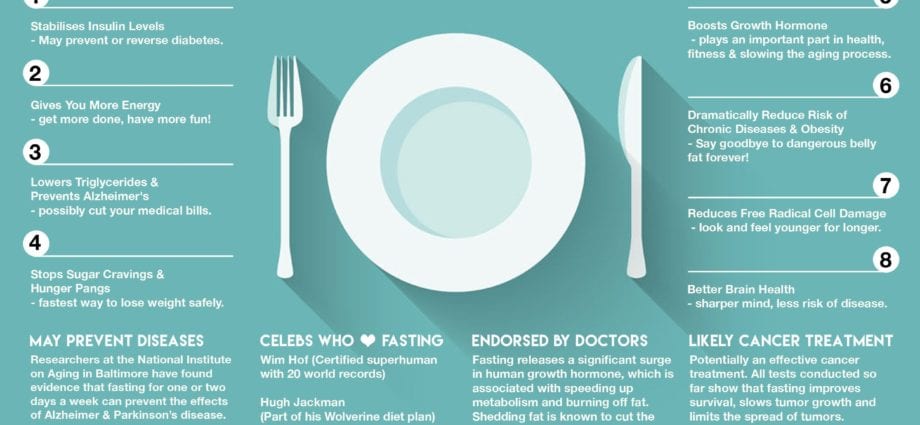Contents
Anna Borisova, gastroenterologist at the Austrian health center Verba Mayr
Intermittent fasting is not new. This style of eating belongs to Indian Ayurveda, created over 4000 years ago. It owes its current popularity to the scientist Yoshinori Osumi, who was the first to say that hunger and lack of nutrients – start the process of natural release of cells from everything harmful and unnecessary, which prevents the development of many diseases.
Intermittent fasting should be approached wisely, having prepared your body in advance. Avoid anything that alters metabolism and provokes hunger, such as smoking and coffee. Gradually reduce the number of calories consumed per day to a maximum of 1700. I also advise you to undergo a medical examination and assess the general condition of the body, make sure there are no contraindications. If you are a fan of daily physical activity, it is better to reduce your activity during the fast.
Intermittent fasting scheme
In any case, it is better to start with the most gentle 16: 8 scheme. With this mode, you should refuse only one meal, for example, breakfast or dinner. To begin with, you should adhere to such a scheme 1-2 times a week, gradually making it a daily diet. The next step can be a refusal to eat for 24 hours, and the most experienced practice and 36 hours of hunger.
During the hours when it is allowed to eat, do not forget about the balance in the diet. Of course, you can do anything: sweet, flour, and fried, but to achieve the best result, you should control yourself. Stick to basic nutritional principles, eat more protein and fewer fast carbs. And remember that giving up food does not mean giving up water! It is necessary to drink as much as possible: water not only dulls the feeling of hunger, but also accelerates the detoxification process, improves muscle and skin tone.
Pros of Intermittent Fasting
What are the benefits of this nutritional principle? Weight correction without strict food restrictions, accelerating metabolism, cleansing and detoxifying the body, improving brain activity, preventing diseases. So, due to a noticeable decrease in blood sugar levels, the risk of diabetes decreases, the functioning of the kidneys, pancreas, and the state of blood vessels improves. Due to the large amount of free energy that is released due to the breakdown of fat stores, brain activity improves. The “hunger hormone” also contributes to the regeneration of nerve cells involved in the memory process.
Contraindications for intermittent fasting
With all the advantages of intermittent fasting, it is worth remembering the restrictions that prohibit practicing it.
- Fasting is not suitable for people suffering from diseases of the gastrointestinal tract: they need to eat regularly and correctly.
- Fasting should also be avoided for people with diabetes, pregnant and lactating women, as well as in the presence of cancer.
- It is important to be careful if you have hypotension – low blood pressure, as the risk of fainting increases significantly.
- You need to get tested beforehand to make sure that you are not deficient in vitamins. And if some minerals are not enough, then it is better to replenish them in advance.
Natalia Goncharova, nutritionist, President of the European Nutritional Center
Is it true that fasting is the cure for cancer? Unfortunately not! Whatever fashionable coaches and authors of all sorts of articles tell you that intermittent fasting relieves cancer cells and the scientist Yoshinori Osumi even received the Nobel Prize for such a discovery – this is not so.
The trend for intermittent fasting originated in Silicon Valley, like all trends for the so-called, eternal life, etc. A prerequisite for this was the work of the Japanese scientist Yoshinori Osumi on the topic of cell autophagy. I am often asked to provide the correct fasting regimen, for which this scientist received the Nobel Prize. So I had to figure it out.
So,
- Yoshinori Osumi received the Nobel Prize for his study of autophagy in yeast.
- No research has been done on humans, and it’s not a fact that cell regeneration (autophagy) will work the same way.
- Yoshinori has never dealt with intermittent fasting and diet issues.
- The subject of autophagy is 50% understood, and can have negative consequences if autophagy techniques are applied to humans.
The scientist himself came to Moscow in January 2020 and confirmed all of the above. Imagine people leaving the room during his refutation of the intermittent fasting method. Refused to believe and fled from disappointment!
Classical dietetics and nutriciology support fasting days, as it is genetically determined, and gives the body both a shake-up and a discharge. At the same time, you always need to remember that there are contraindications, there are individual characteristics, so you need to consult with your doctor supervising you, as well as with a nutritionist.










